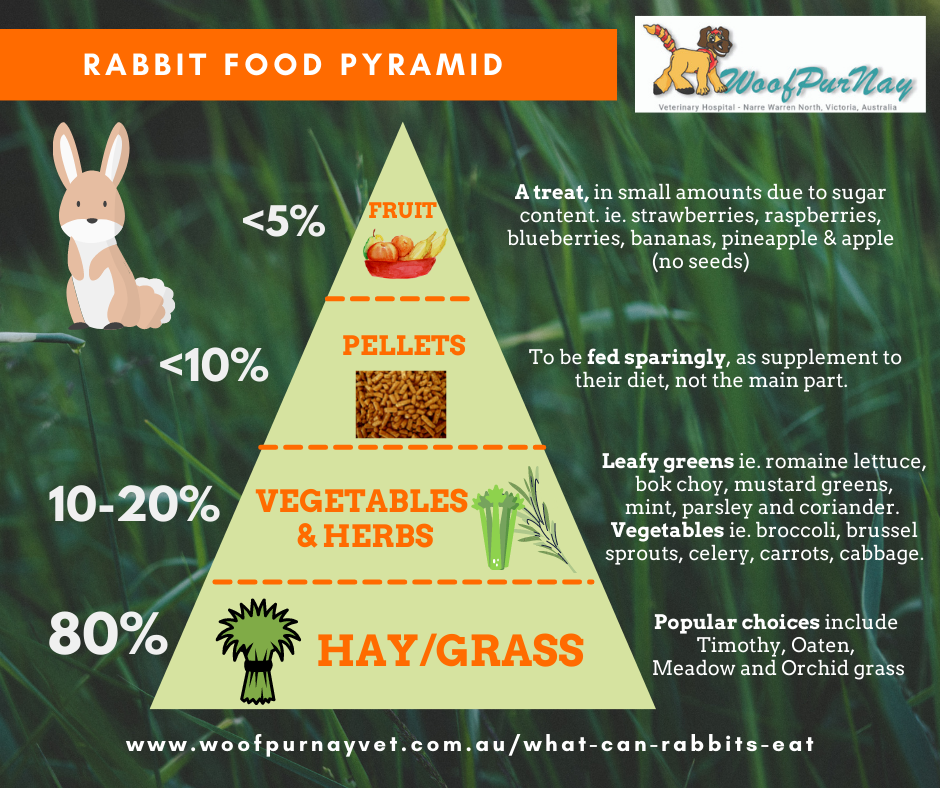Nutrition is an important part of pet care. A complete and balanced diet is essential for your rabbit’s health and wellbeing. Rabbits are grazing animals so they need plenty of roughage to chew on. Their teeth are also constantly growing so regular eating helps to keep their teeth trim and healthy.
Rabbit food pyramid
So, what can rabbits eat? Rabbits should have a daily supply of fresh hay or grass, which should make up the bulk of your rabbits diet (about 80% of their overall diet). They should also be given a smaller amount of fresh vegetables or herbs and a limited number of pellets. Your rabbit will also need access to fresh, clean water at all times.
The aim is to keep their feeds and feeding habits consistent. Any changes to their diet should be made gradually to minimise digestive upsets.
Fresh hay or grass
Rabbits should have a constant supply of fresh hay or grass, which should make up the bulk of your rabbits diet (about 80% of their overall diet). Fresh hay or grass provides the essential fibre needed for good digestive health, whilst also helping to wear your rabbit’s teeth down.
Fresh hay provides the same health and digestive benefits of fresh grass and there are many different hays available. Popular choices of rabbit hay include Timothy, Oaten, Meadow and Orchid grass. Other suitable options include Wheaten, Pasture, Paddock or Ryegrass hays. Many rabbits enjoy a mixture of these hays if you can provide it. Alfalfa hay is fine for young, growing rabbits (approximately under 7 months old) as they need the extra protein and calcium, but it is not recommended for adult rabbits.
Grass is the most natural food for a rabbit to eat. However, grass should be introduced gradually if your rabbit is not used to eating it. The ideal set-up is a secure exercise pen on grass, but this is not always practical. Alternatively, you can grow grass from seed in a pot or tray. You can also cut grass with scissors and scatter it around their pen. Do not offer lawn mower clippings to your rabbit as it can cause major stomach upsets.
Fresh vegetables and herbs
Rabbits should be given a daily supply of fresh vegetables & herbs (about 10-20% of their overall diet). Great examples include leafy greens like romaine lettuce, bok choy, mustard greens, mint, parsley and coriander. Other vegetables that are great to feed a couple of times a week include broccoli, brussel sprouts, celery, carrots and cabbage.
If you are growing your own vegetables, make sure they are free from pesticides as these can be harmful to your pet. Also, don’t feed your rabbit any vegetables or herbs that are going bad, wilting or getting mouldy. If you wouldn’t eat them, don’t feed them to your rabbit.
Can rabbits eat spinach? Whilst spinach contains lots of vitamins and nutritious substances, rabbits can only each spinach in small amounts as they contain high levels of oxalates that can hinder your rabbit’s urinary tract and produce itchiness in the skin or mouth if eaten in large quantities.
Can rabbits eat cucumber? Rabbits can safely eat cucumber flesh, skin and seeds in small amounts. Only ever give your rabbit a few small pieces at a time. Cucumber contains few nutrients and has a high water content and can cause diarrhea if eaten in excess.
Fresh fruit
Fruit can be given as a treat to rabbits, but only in small amounts due to the sugar content. This could include strawberries, raspberries, blueberries, bananas, pineapple and apple (no seeds). Your rabbits favourite fruit can be used for training purposes in small amounts.
Can rabbits eat grapes? Adult rabbits can eat one or two grapes very occasionally as a treat. However, they should not be fed regularly due to their high sugar and water content which can cause obesity and upset stomachs.
Pellets
Rabbit pellets can be fed sparingly, however should only be given as supplement to their diet, not be the main part. Pellets should make up less of your rabbit’s diet as they grow older. Alfalfa pellets are fine for young rabbits (approximately under 7 months old) but timothy pellets are a better choice for older rabbits.
Objects to chew on
Provide your rabbit with chewing objects to help entertain them and wear their teeth down. Great examples include grass matts, tunnels and hutches. There is a great variety of rabbit safe balls, sticks and hanging chew toys. You can also offer wooden branches (remove any smaller protruding branches that may poke into their eyes). Cardboard boxes and tubes are great fun for rabbit too. Just make sure you remove any tape or packaging that can be harmful to your rabbit.
Fresh water
Your rabbit will need plenty of fresh, clean water. You can use a bowl, bottle or water dispenser. The water will need to be cleaned and changed daily.
What NOT to feed rabbits
There are many foods that can be harmful to their health and cause digestive problems. DO NOT feed your rabbit grains, cereals, nuts, lawn clippings, garden shrubs, rhubarb leaves or human food such as chocolate, bread, biscuits, chips or pasta.
Rabbits will thrive on a complete and balanced diet that includes mainly fresh hay or grass, a smaller amount of fresh vegetables and herbs and a limited number of pellets. They also need a constant supply of fresh water. If you have any questions about nutrition and your pet rabbit, please call us on 03 8784 4444.






